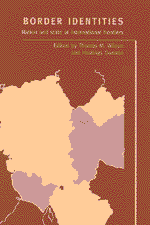Book contents
- Frontmatter
- Contents
- List of maps
- List of contributors
- Acknowledgements
- 1 Nation, state and identity at international borders
- 2 State formation and national identity in the Catalan borderlands during the eighteenth and nineteenth centuries
- 3 A western perspective on an eastern interpretation of where north meets south: Pyrenean borderland cultures
- 4 The ‘new immigration’ and the transformation of the European-African frontier
- 5 Transnationalism in California and Mexico at the end of empire
- 6 National identity on the frontier: Palestinians in the Israeli education system
- 7 Grenzregime (border regime): the Wall and its aftermath
- 8 Transcending the state? gender and borderline constructions of citizenship in Zimbabwe
- 9 Borders, boundaries, tradition and state on the Malaysian periphery
- 10 Markets, morality and modernity in north-east Turkey
- 11 Imagining ‘the South’: hybridity, heterotopias and Arabesk on the Turkish–Syrian border
- Author index
- Subject index
8 - Transcending the state? gender and borderline constructions of citizenship in Zimbabwe
Published online by Cambridge University Press: 02 December 2009
- Frontmatter
- Contents
- List of maps
- List of contributors
- Acknowledgements
- 1 Nation, state and identity at international borders
- 2 State formation and national identity in the Catalan borderlands during the eighteenth and nineteenth centuries
- 3 A western perspective on an eastern interpretation of where north meets south: Pyrenean borderland cultures
- 4 The ‘new immigration’ and the transformation of the European-African frontier
- 5 Transnationalism in California and Mexico at the end of empire
- 6 National identity on the frontier: Palestinians in the Israeli education system
- 7 Grenzregime (border regime): the Wall and its aftermath
- 8 Transcending the state? gender and borderline constructions of citizenship in Zimbabwe
- 9 Borders, boundaries, tradition and state on the Malaysian periphery
- 10 Markets, morality and modernity in north-east Turkey
- 11 Imagining ‘the South’: hybridity, heterotopias and Arabesk on the Turkish–Syrian border
- Author index
- Subject index
Summary
The frontiers are there, the frontiers are sacred. What else, after all, could guarantee privilege and power to ruling elites?
Yet the peoples, it would seem, see matters differently … The frontiers, for them, remain a foreign and unwarranted imposition … So that even while a ‘bourgeois Africa’ hardens its frontiers, multiplies its frontier controls, and thunders against the smuggling of persons and goods, a ‘peoples' Africa’ works in quite another way. For if the smuggling of goods and persons appears perverse and wicked when seen by governments in place, peoples in place can evidently find it right enough, and even natural.
(Davidson 1986: 43, 44)Introduction
Zimbabwe, like most newly independent states, is still attempting to construct its populist nationhood, now under the dominating ideas of a black male elite. But not all of its citizens, especially women and nonblacks, construct their identities and relationships to the state in ways that are congruent with the state's contemporary construction of a national identity for its citizens. In the ongoing political fight to delimit citizenship, reflecting differing ideological notions about the ‘proper relationship between the individual and society’ (Blackburn 1993: 1), these competing definitions of citizenship seem to be regarded as ‘borderline’ constructions by the social categories who do not accept them. In this chapter, I explore discrepancies between the Zimbabwean state and a particular category of its internationally mobile citizens over the construction of citizenship as identity in the ‘cultural mindset’ of transborder traders, a mindset that seems not to be anchored in the territory of any nation-state, but does respond to the laws of the state of citizenship.
- Type
- Chapter
- Information
- Border IdentitiesNation and State at International Frontiers, pp. 191 - 214Publisher: Cambridge University PressPrint publication year: 1998
- 6
- Cited by



